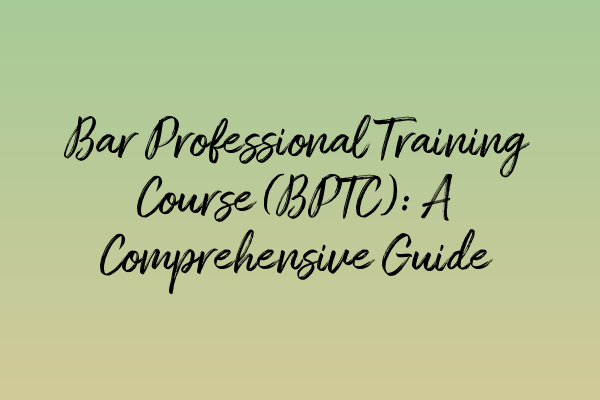Bar Professional Training Course (BPTC): A Comprehensive Guide
Welcome to our comprehensive guide on the Bar Professional Training Course (BPTC). If you are considering a career as a solicitor, this course is an essential step towards becoming a qualified barrister. In this guide, we will take you through everything you need to know about the BPTC, including its purpose, structure, and how to excel in the course.
What is the BPTC?
The Bar Professional Training Course (BPTC) is a postgraduate course designed to provide aspiring barristers with the necessary skills and knowledge to practice as advocates in the English legal system. It is a vocational course that focuses on advocacy, legal research, drafting, and professional ethics.
The BPTC is a mandatory requirement set by the Bar Standards Board (BSB) for anyone who wishes to become a barrister in England and Wales. It is typically completed after obtaining a qualifying law degree (LLB) or an alternative qualification recognized by the BSB.
Structure of the BPTC
The BPTC usually takes one academic year (or two years part-time) to complete. It is divided into two main parts: the taught component and the practical component.
Taught Component
The taught component of the BPTC is aimed at providing you with the essential knowledge and skills required for practice at the Bar. It includes a range of subjects such as civil litigation, criminal litigation, evidence, family law, and professional ethics.
During the taught component, you will attend lectures, workshops, and practical sessions where you will learn about advocacy techniques, legal research methods, drafting skills, and ethical considerations. You will also have the opportunity to participate in simulated court exercises and engage in mooting competitions to enhance your courtroom skills.
Practical Component
The practical component of the BPTC focuses on applying the knowledge and skills acquired during the taught component to real-life scenarios. It includes two main elements: the advocacy and the conference assessment.
In the advocacy assessment, you will be required to present oral arguments and demonstrate your advocacy skills in front of a simulated court. This assessment is designed to evaluate your ability to analyze legal issues, present persuasive arguments, and handle challenging questions from judges.
In the conference assessment, you will be required to conduct a face-to-face client interview and provide legal advice based on the client’s circumstances. This assessment is aimed at assessing your ability to communicate effectively with clients, identify relevant legal issues, and provide practical solutions.
Tips to Excel in the BPTC
Successfully completing the BPTC requires dedication, hard work, and effective study strategies. Here are some tips to help you excel in the course:
- Organize your time: Create a study schedule that allows you to cover all the necessary materials and allocate time for revision.
- Take advantage of resources: Make use of libraries, online databases, and study materials provided by your BPTC provider. Our related articles on SQE Prep Made Easy: Strategies and Resources and SQE Prep: Tips and Tricks to Excel in Criminal Law can also be helpful in enhancing your knowledge and understanding.
- Practice regularly: Engage in mooting activities and participate in simulated exercises to hone your advocacy and drafting skills.
- Seek feedback: Request feedback from tutors, peers, and experienced barristers to identify areas for improvement and refine your techniques.
Conclusion
The Bar Professional Training Course (BPTC) is a critical step towards becoming a qualified barrister in England and Wales. Its comprehensive curriculum and practical assessments are designed to equip aspiring barristers with the necessary knowledge and skills to excel in the legal profession.
If you are considering a career as a barrister, the BPTC should be an integral part of your journey. By dedicating yourself to the course and following the tips mentioned in this guide, you can increase your chances of success and prepare yourself for a rewarding and fulfilling career as an advocate.


Leave a Reply